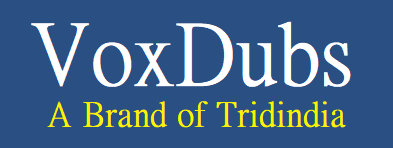Dubbing is a technique used in the entertainment industry to replace the original dialogue or voiceover of a film, television show, video, or any audiovisual content with a new voice track in a different language or for a different audience.
This process is essential for reaching global and multilingual audiences, allowing people from diverse linguistic backgrounds to enjoy the same content.
In this blog, we will explore what dubbing is, its significance, and the intricate process behind making it work.
What is Dubbing?
Dubbing, also known as lip-syncing or language replacement, involves recording new dialogue or narration in a different language or voice to replace the original audio of a video.
This enables viewers who do not understand the original language to follow the content in their native tongue.
It is commonly used in films, TV shows, animations, documentaries, advertisements, and video games.
Significance of Dubbing
Dubbing is of immense significance for several reasons:
1- Global Reach
Dubbing allows content creators to expand their audience base by making their content accessible to viewers worldwide, regardless of language barriers.
2- Cultural Adaptation
Dubbing ensures that the content resonates with the cultural sensibilities of the target audience.
It adapts jokes, idioms, and cultural references to be more relevant to the local audience.
3- Preservation of Original Content
Dubbing allows the original visual and acting performances to remain intact, maintaining the integrity of the content while making it accessible to diverse audiences.
The Dubbing Process
The dubbing process is a meticulous and multistep procedure involving several key stages:
1- Translation
Professional translators transcribe and adapt the original dialogue into the target language while ensuring that the essence and meaning of the content remain intact.
2- Voice Casting
An essential aspect of reliable dubbing is selecting suitable voice-over artists.
These artists must have vocal talents that match the original actors’ voices and accurately convey the emotions and tone of the characters.
3- Recording
The selected voice-over artists record their lines in a soundproof recording studio. Skilled directors and sound engineers monitor the recording to achieve the best possible vocal performances.
4- Lip-Syncing
Lip-syncing is the process of matching the new dialogue with the lip movements of the original actors on screen.
This is a challenging task that requires precision and synchronization.
5- Audio Mixing and Editing
Once the new dialogue is recorded and synchronized, sound engineers mix and edit the audio to ensure clarity, consistency, and balance between the dialogue, sound effects, and music.
6- Quality Control
Rigorous quality control is conducted to detect any errors or discrepancies in the dubbing, such as lip-sync issues or audio inconsistencies.
Corrections are made to achieve a polished final product.
Challenges in Dubbing
Dubbing is a complex process that comes with its own set of challenges:
1- Lip-Sync Accuracy
Achieving perfect lip-sync is challenging, especially when translating dialogue from one language to another, as languages differ in length and structure.
2- Cultural Adaptation
Adapting cultural nuances, jokes, and references in a way that resonates with the target audience without altering the original intent can be tricky.
3- Voice Casting
Selecting appropriate voice-over artists who can convincingly portray the characters is crucial for the success of the dubbed version.
Conclusion
Dubbing is a powerful tool that facilitates cross-cultural communication and enables content creators to reach diverse audiences globally.
By undergoing a meticulous process involving translation, voice casting, recording, lip-syncing, and quality control, dubbing ensures that viewers can enjoy their favorite content in their native language, fostering a deeper connection between the content and its audience.
For more information contact VoxDubs at +91-8527599201 or grab an instant quote.
